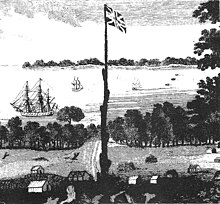Cline Town: Difference between revisions
Woohookitty (talk | contribs) m WikiCleaner 0.99 - Repairing link to disambiguation page - (You can help) |
Citation bot (talk | contribs) Alter: url. URLs might have been anonymized. | Use this bot. Report bugs. | Suggested by AManWithNoPlan | #UCB_webform 642/2200 |
||
| (42 intermediate revisions by 25 users not shown) | |||
| Line 1: | Line 1: | ||
{{Use dmy dates|date=February 2021}} |
|||
[[ |
[[File:Province of Freedom.jpg|thumb|right|Looking north to Bullom Shore from ''Voyages to the River Sierra Leone'' by John Matthews, 1788]] |
||
| ⚫ | |||
'''Cline Town''' is an area in [[Freetown, Sierra Leone]]. The area is named for Emmanuel Kline, a [[Hausa people|Hausa]] Liberated African who bought substantial property in the area. The neighborhood is in the vicinity of Granville Town, a settlement established in 1787 and re-established in 1789 prior to the founding of the Freetown settlement on 11 March 1792. |
|||
| ⚫ | Granville Town, as Cline Town was known at the time, was established in 1787 by the London-based [[Committee for the Relief of the Black Poor]]. They arranged for the transport of London's so-called Black Poor to Sierra Leone where they were amongst its original settlers. Many of these Black Poor were [[Black Loyalist]]s who had decided or were forced to leave the United States after the [[American War of Independence]]; some came via several years in [[Nova Scotia]], another [[British North America]]n colony and so are known as [[Black Nova Scotians]]. All asserted a [[British Empire|British]] identity. Some were formerly [[West Indian]] enslaved [[wikt:Afro-Caribbean|Africans]]. Some British wives also were part of the settlement.<ref name="Schama">{{cite book|title=[[Rough Crossings|Rough Crossings: Britain, the Slaves and the American Revolution]]|last=Schama|first=Simon|year=2006|author-link1=Simon Schama|isbn=978-0-06-053916-0}}'' ''</ref> Granville Town (named for its benefactor and patron [[Granville Sharp]]) was established as the first town of the [[Province of Freedom]] before it was destroyed in 1789. The town was rebuilt in 1791 with the assistance of [[Alexander Falconbridge]], a former surgeon on a slave ship.<ref>{{cite book |author1=Smith, Johanna M. |author2=Barros, Carolyn A. |title=Life-Writings by British Women, 1660–1815: an anthology |publisher=Northeastern University Press |location=Boston |year=2000 |isbn=1-55553-432-5 |url= https://books.google.com/books?id=blLFwTSeOmcC&dq=%22Alexander+Falconbridge%22&pg=PA292|page= 292}}</ref> |
||
==Sources== |
|||
*''[[Rough Crossings]]'' by [[Simon Schama]] |
|||
This settlement differed from the [[Freetown Colony]] that was established on 11 March 1792 by the [[Nova Scotian Settlers]].<ref name="Schama" /> Although the [[Nova Scotian Settlers|Nova Scotians]] established Freetown in 1792, the [[Jamaican Maroons]] were settled in Granville Town in 1800 following their arrival from Nova Scotia. However, by 1800, the settlement had been largely abandoned following attacks by [[Temne people|Temne]] tribesmen of the Koya Empire, and the Maroons were soon after moved to the Freetown settlement where they formed a district that would be known later as [[Maroon Town, Sierra Leone|Maroon Town]]. Some [[Sierra Leone Creole people|Creole]] families such as the Clarkes and Reeds (Reids) may be descendants of the Old Settlers.<ref name="Schama" /> |
|||
== References == |
|||
<references /> |
|||
==External links== |
|||
*{{cite web|url=http://www.c-span.org/video/?193333-1/words-simon-schama|title=After Words with Simon Schama |last=Medford |first=Edna |date=26 June 2006 |website=C-SPAN |access-date=15 May 2018 |quote=Simon Schama was interviewed about his book ''Rough Crossings: Britain, the Slaves and the American Revolution'', published by Ecco.}} |
|||
{{coord missing|Sierra Leone}} |
{{coord missing|Sierra Leone}} |
||
[[Category:Freetown]] |
[[Category:Neighbourhoods in Freetown]] |
||
[[Category:Populated places established in 1787]] |
|||
{{SierraLeone-geo-stub}} |
|||
[[Category:1780s in Africa]] |
|||
[[Category:History of Sierra Leone]] |
|||
[[Category:1787 establishments in the British Empire]] |
|||
Latest revision as of 18:10, 9 December 2021

Cline Town is an area in Freetown, Sierra Leone. The area is named for Emmanuel Kline, a Hausa Liberated African who bought substantial property in the area. The neighborhood is in the vicinity of Granville Town, a settlement established in 1787 and re-established in 1789 prior to the founding of the Freetown settlement on 11 March 1792.
Granville Town, as Cline Town was known at the time, was established in 1787 by the London-based Committee for the Relief of the Black Poor. They arranged for the transport of London's so-called Black Poor to Sierra Leone where they were amongst its original settlers. Many of these Black Poor were Black Loyalists who had decided or were forced to leave the United States after the American War of Independence; some came via several years in Nova Scotia, another British North American colony and so are known as Black Nova Scotians. All asserted a British identity. Some were formerly West Indian enslaved Africans. Some British wives also were part of the settlement.[1] Granville Town (named for its benefactor and patron Granville Sharp) was established as the first town of the Province of Freedom before it was destroyed in 1789. The town was rebuilt in 1791 with the assistance of Alexander Falconbridge, a former surgeon on a slave ship.[2]
This settlement differed from the Freetown Colony that was established on 11 March 1792 by the Nova Scotian Settlers.[1] Although the Nova Scotians established Freetown in 1792, the Jamaican Maroons were settled in Granville Town in 1800 following their arrival from Nova Scotia. However, by 1800, the settlement had been largely abandoned following attacks by Temne tribesmen of the Koya Empire, and the Maroons were soon after moved to the Freetown settlement where they formed a district that would be known later as Maroon Town. Some Creole families such as the Clarkes and Reeds (Reids) may be descendants of the Old Settlers.[1]
References[edit]
- ^ a b c Schama, Simon (2006). Rough Crossings: Britain, the Slaves and the American Revolution. ISBN 978-0-06-053916-0.
- ^ Smith, Johanna M.; Barros, Carolyn A. (2000). Life-Writings by British Women, 1660–1815: an anthology. Boston: Northeastern University Press. p. 292. ISBN 1-55553-432-5.
External links[edit]
- Medford, Edna (26 June 2006). "After Words with Simon Schama". C-SPAN. Retrieved 15 May 2018.
Simon Schama was interviewed about his book Rough Crossings: Britain, the Slaves and the American Revolution, published by Ecco.
